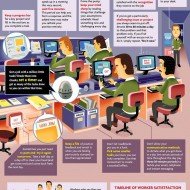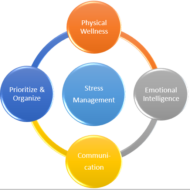Posted by Managementguru in How To, Human Resource, Strategy, Stress Management, Time Management, Training & Development
on Sep 15th, 2015 | 0 comments

Work Can be Play – How to Overcome Burnout? Let me Start With Some Quotes to Motivate You: “There are no secrets to success; it is the result of preparation, hard work and learning from failure.” “Falling down is how we grow. Staying down is how we die.” “Success is going from failure to failure without losing your enthusiasm.” “You must be the change you wish to see in the world. “Keep your face to the sunshine and you can never see the shadow.” Strategy of Smart Work I would like to suggest a few ways as to “How to improve your efficiency and quality of your work” without feeling the pinch. You don’t need to put in enormous hours of work to prove your mettle as it might only make you more exhausted and drain you of your physical and mental stamina. When we’re working hard, other areas of our life get neglected: Maybe you’re working long hours but eating poorly and never exercising. It might not seem like such a bad choice now, but when you run into health problems a few years down the road, you’re going to wish you’d found a better balance. Working too hard can have a really negative effect on your quality of life, too. Long hours and the pressure to keep doing more can lead to stress, burn out, depression, or just that miserable feeling of is this all there is to life? So how can you get away from the mindset of working hard and start working smart? Every 20 minutes take a break – Getting up to have a coffee or some water will make you feel agile. This suits well for the desk potatoes who are wedded to the computers. Prioritize the issues to be sorted out that particular day and focus your attention only on those issues until they are solved. This acts as a positive reinforcer and prepares you for the next challenge. If you find yourself with an excuse not to do it, tell yourself “Do it now”. “First Things First” is one of Stephen Covey’s “7 Habits” in 7 Habits of Highly Effective People. It means taking care of the most important things in your life before turning to the rest. Rather than trying to do everything at once, pick one or two key goals for each year, and focus wholeheartedly on those. It’s much better to actually accomplish a dream than to have a vague stab at lots of different things … only to end up making very little progress. Info: Pickthebrain.com Learn to say “NO” However, you can easily take it too far. At some point, you need to learn to decline opportunities. Your objective should be to take on only those commitments that you know you have time for and that you truly care about. Sleep at least 7-8 hours. Most people need 7-8 hours of sleep for their bodies and minds to function optimally. You know if you’re getting enough. Listen to your body, and don’t underestimate the value of sleep. Devote your entire focus to the task at hand. Close out all other browser windows. Put your phone away, out of sight and on silent. Find a quiet place to work, or listen to some music if that helps you. Exercise and eat healthy Numerous studies have linked a healthy lifestyle with work productivity. Similar to getting enough sleep, exercising and eating healthily boost energy levels, clear your mind, and allow you to focus more easily. Delineate a time limit in which to complete task. Instead of just sitting down to work on a project and...

Posted by Managementguru in How To, Human Resource, Interview Questions, Organisational behaviour, Stress Management
on Jun 21st, 2014 | 0 comments

A job interview can be viewed as a mutual “exchange of information” because it provides the candidate with an opportunity to both gain information about the department and position, and to discuss his/her own skills, and career goals in relation to the job. Interviewing helps managers determine three things before they make a hiring decision. 1. Can you do the job? 2. Are you motivated to do the job? 3. Are you a good fit in the organization? Acing yourself is an important part of the interview process. The time you spend gearing up before the interview will be time well spent in your job search process. The following are some tip-offs on what you can do to prepare yourself before, during, and after a job interview. Before the Interview Assess the Job Specification and Position Description Review your résumé and be prepared to discuss your appropriate skills. Decide who your references are. A current or past manager, coworker, teacher/professor or associate may come in handy to vouch for your skills/accomplishments. Be ready with extra copies of your résumé Dress for Success -Appearance should display maturity and self-confidence. Be neat, clean, and dress in good taste. Find out where the interview will be, obtain clear directions, and confirm the time. Plan to arrive 10- 15 minutes early. During the Interview Relax! Think of the interview as a conversation, not a cross-examination Be whole-hearted, self-assured, polite, and open. Listen to the questions carefully and give clear, crisp, and precise answers. Convey interest in the organization and knowledge of the position. Ask relevant questions about the job or department. Present a list of your references and any letters of recommendation or reference that you may have to offer. End the interview with a firm handshake and thank the interview panel for their time and consideration. After the Interview Send a crisp thank-you letter within 24 to 48 hours of the interview. Reiterate your interest in the position; mention the key skills you know that strengthen your place in the organization, and your contact information. If you are not chosen for the job, it is OK to graciously accept your defeat and ask the interviewer which area(s) you could improve on in the future!...

Posted by Managementguru in Human Resource, Motivation, Organisational behaviour, Principles of Management, Stress Management, Training & Development
on Mar 19th, 2014 | 0 comments

Did you know that without your knowledge, your health might be deteriorating due to pressure at work. Effective stress management is the only way out to become happier, healthier, and more productive. Whatever we do or say has a direct effect on our physiological processes as it affects our psyche-both positive and negative. While positive vibes act as a booster to our health, enhances the morale causing increased productivity which is “THE CONTRIBUTION FACTOR” in corporate organisations, negative vibes causes distress to the party affected and in-turn the organisation. Though in a small way, which is enough to cause great distress waves amonsgt the entire organisation through grapevine. Morale Surveys Therefore, it becomes necessary that every organisation takes some time to understand and analyse the mind-set of their employees to maintain the entire health of their firm. This can be done through surveys or questionnaires which serve as best platforms that shoulder employees’ opinion. On the side of the individual, he also should spare some time, from time-to-time to analyse his attitude towards the organisation and his/her colleagues and how it affects his/her performance. Management scholars say that “SELF-APPRAISAL” is the best tool for enhanced organisational performance and productivity. What is Stress? It is very important to understand what stress is, to combat it. Stress is nothing but a condition where people get excited emotionally or in other words ” a disturbed mental state” affecting the well-being. The causal agents may be physiological which can be medically treated or emotional which we are more worried about as emotionally unstable individuals cannot think properly which again leads to physical distress. It becomes therefore vital to know how we perceive and interpret things through our cognitive skills, again influenced by environmental factors to a considerable extent. People, particularly working in corporate environment and IT industry are subjected to much stress and they don’t know how to find a vent to their feelings or when there is no adequate support from the family side. What are the Ways Out? So, what is it we do at times like these? Not to bother. The mantra is “RELAX” to the maximum possible extent. First thing extract yourself away from the scene of action so that you could breathe some fresh air. Then think calmly and try to isolate the bug that is bothering you. Here the problem is the bug and analyse how far you have become vulnerable to the situation. Gauge the amount of damage done and rate the problem in terms of ” recoverable by myself- no help needed”, ” recoverable- but with external support”. Remember, for every problem there is a solution. It may not be tailor- made, but definitely passable with little bit of compromise from our end if necessary. 10 Yoga Poses You Should Do Everyday to Combat...






